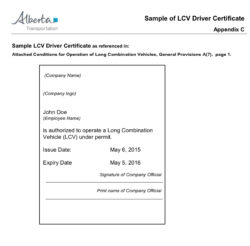Alberta’s transportation industry is vast and diverse, with a range of vehicles designed to meet the province’s unique needs.
Among these is the Long Combination Vehicle (LCV), a specialized vehicle configuration designed for transporting larger loads over extended distances.
But how does one become qualified to operate an LCV in Alberta? Let’s explore.
Steps to Obtain an LCV License in Alberta
The process of obtaining an LCV license in Alberta is comprehensive, ensuring that drivers are well-equipped to handle the unique challenges of operating such a vehicle.
LCV Application – Alberta Transportation
Here are the steps and requirements:
- Eligibility: To begin, you must have a valid Class 1 driver’s license.
- Driving Experience: A minimum of 5 years of verifiable Class 1 driving experience is required.
- Mountain Experience: At least 2 years of verifiable mountain driving experience is essential.
- Driver’s Abstract: Your driving record should have no more than 6 demerits and no suspensions or violations in the past 12 months.
- Medical Examination: A thorough medical examination is required, and you must submit a report confirming your fitness to drive.
- Training: Completion of specific training programs, such as the Air Brake Program and LCV Instructor Training, is mandatory.
Minimum Driver Requirements for LCV in Alberta:
- License Class: Must hold a valid Class 1 driver’s license or equivalent.
- Experience: A minimum of 24 months or 150,000 km of driving experience with articulated vehicles.
- Professional Course: Passed a Professional Driver Improvement Course (PDIC) within the past 48 months.
- LCV Training: Passed the Alberta Motor Transport Association’s “Longer Combination Vehicles (LCV) Driver Training Course” or an equivalent course.
- Driver’s Abstract: Provide a Driver’s Abstract to the Carrier, dated not more than one month prior to the issue date of the LCV Driver’s Certificate. The abstract must show:
- No driving-related criminal code convictions in the past 36 months.
- Not more than 2 moving convictions (violations) in the past 12 months.
- Not more than 3 moving convictions (violations) in the past 36 months.
- Regulation and Permit Training: In the last 12 months, the driver must have been instructed on all current regulations, permit conditions, and issues covering the operation of LCVs.
These requirements ensure that drivers operating LCVs in Alberta are well-trained and have a track record of safe driving.
Alberta LCV Training Course Outline
The LCV training course is meticulously designed to provide drivers with comprehensive knowledge and hands-on experience to operate Long Combination Vehicles safely and efficiently.
Here’s a more detailed breakdown of the course content:
- Introduction to LCVs:
- Overview of what LCVs are and their configurations.
- Understanding the significance of LCVs in Alberta’s transportation industry.
- Differentiating between various LCV types and their specific applications.
- Safety Protocols:
- Detailed procedures for conducting thorough pre-trip inspections.
- Techniques for effective load securement to prevent cargo shifts.
- Emergency procedures, including breakdowns and accident protocols.
- Importance of maintaining safe following distances and understanding stopping distances.
- Operational Techniques:
- Hands-on training for coupling and uncoupling trailers.
- Techniques for maneuvering LCVs in tight spaces, such as docking bays.
- Handling the vehicle in various weather conditions, including rain, snow, and fog.
- Best practices for fuel efficiency and eco-friendly driving.
- Mountain Driving:
- Challenges of navigating LCVs in mountainous terrains.
- Techniques for handling steep grades and descents.
- Proper use of engine brakes and transmission gearing.
- Navigating hairpin bends and understanding the risks of rollovers.
- Regulations and Compliance:
- Comprehensive overview of Alberta’s LCV regulations.
- Understanding the legal aspects of operating LCVs, including permits and documentation.
- Staying updated with changes in transportation laws and how they impact LCV operations.
The course is structured to ensure that drivers not only gain theoretical knowledge but also practical skills, making them confident and competent LCV operators.
Duration and Structure of the LCV Training Course
The LCV training course is designed to be thorough and comprehensive, ensuring that drivers are well-equipped to handle the challenges of operating Long Combination Vehicles.
Here’s a breakdown of the course’s duration and structure:
- Course Length:
- The LCV training typically spans over several days, ensuring ample time for both theoretical instruction and hands-on practice.
- Theoretical Instruction:
- This portion usually takes up the initial days of the course.
- Drivers are introduced to the basics of LCVs, safety protocols, operational techniques, mountain driving, and regulations.
- Interactive sessions, including quizzes and discussions, are often incorporated to test understanding and encourage engagement.
- Practical Training:
- Following the theoretical sessions, drivers move on to the hands-on training segment.
- This involves actual driving sessions where participants can practice maneuvers, coupling and uncoupling trailers, and handling the vehicle in different conditions.
- Each driver is given individual attention to ensure they grasp the techniques correctly.
- Assessment:
- At the end of the training, participants undergo an assessment to test their understanding and skills.
- This includes both a written test covering the theoretical aspects and a practical driving test.
- Successful completion of the assessment is crucial for certification.
- Certification:
- Upon passing the assessment, drivers are awarded a certification, indicating their competence in operating LCVs.
- This certification is recognized by transportation authorities in Alberta and is essential for those looking to drive LCVs commercially.
It’s important to note that while the above structure is typical, the exact duration and sequence might vary depending on the training institution and specific course offerings.
Always check with the training provider for the most accurate details.
Benefits of an LCV License in Alberta
Having an LCV license in Alberta offers several advantages:
- Efficiency: LCVs can transport larger loads, reducing the number of trips and saving time.
- Economic Benefits: Operating an LCV can lead to cost savings in terms of fuel and manpower.
- Career Opportunities: With an LCV license, drivers can access specialized job opportunities and potentially higher pay scales.
Where to Take the LCV Licensing Course in Alberta
For those looking to obtain their LCV license in Alberta, several reputable institutions offer the necessary training.
Here is a couple Alberta-based schools where you can enrol, or get pointed in the right direction:
- Alberta Motor Transport Association (AMTA)
- Description: AMTA provides a comprehensive Long Combination Vehicle Instructor Training program.
Their course is designed to ensure drivers are well-equipped with the knowledge and skills required for LCV operations. - Website: AMTA LCV Instructor Training
- Description: AMTA provides a comprehensive Long Combination Vehicle Instructor Training program.
- Commercial Vehicle Training Centre (CVTC)
- Description: CVTC offers an Extended Length Combination Vehicle Driver Training program. The course is tailored to provide drivers with the expertise needed to safely operate LCVs on Alberta roads.
- Contact: 403-253-4449
- Website: CVTC LCV Extended Length Training
These institutions are renowned for their commitment to quality training and ensuring that drivers are well-prepared to handle the unique challenges posed by driving long combination vehicles.
If you’re considering obtaining your LCV license in Alberta, these schools are excellent places to start your journey.
FAQs about LCV Licensing in Alberta
What distinguishes an LCV from regular trucks? LCVs are longer vehicle combinations designed to transport larger loads over extended distances.
Are there any specialized training programs for LCV licensing? Yes, programs like the Air Brake Program and LCV Instructor Training are essential for obtaining an LCV license.
Why is mountain driving experience emphasized for LCV licensing? Mountain driving presents unique challenges, and having experience ensures that LCV drivers can navigate these terrains safely and efficiently.
Exploring the World of LCVs in Alberta
LCVs play a crucial role in Alberta’s transportation landscape, ensuring that goods are transported efficiently and safely.
The process of obtaining an LCV license is thorough, reflecting the importance of ensuring that drivers are well-prepared for the task.
Whether you’re considering a career change or looking to expand your driving skills, an LCV license in Alberta is a valuable asset.
In Summary
- Obtaining an LCV license in Alberta requires a combination of experience, training, and medical fitness.
- LCVs offer efficiency and economic benefits for the transportation industry.
- Specialized training programs ensure that LCV drivers are well-prepared for the unique challenges of operating these vehicles.
- Alberta’s LCV licensing process is designed to ensure safety and efficiency on the province’s roads.





